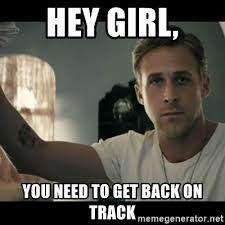At a previous gym job, I was getting up at 4.15 am five days a week to open and was sleeping less than 7 hrs. per night. And before you say I should’ve gone to bed earlier; my bedtime was at 9.15 pm.
That was plenty early.
Anyway, mind your own business.
By the time I’d finished, around mid-afternoon, I was hungry and running on fumes. Then all I had to do was eat and then fall asleep as soon as my head hit the pillow.
Just like Grandpa Simpson.
During my stay at home parent days, when my kids slept, I’d sprint to the bedroom to get my nap in. Because when you’re a parent to toddlers, sleep is always at a premium.
My wife took a bunch of pictures of me sleeping with the kids while drooling all over my pillow. And she uses these as blackmail.
No, you do not get the see them. You’ll never see them.
Let’s get back on track, shall we?

Why (besides the obvious) do you feel tired?
Our energy levels naturally take a dip during early afternoon, usually between 1-3pm. Therefore The National Sleep Foundation recommends a 20 to 30 minute nap to restore alertness and improve performance.
Note- If you’re sleeping at work, hide. 😊
According to the sleep foundation, napping for 20-30 min will not leave you feeling drowsy or affect your big nighttime sleep.
The foundation describes three types of napping:
Planned nap- which involves dedicating time for a nap, and not waiting until you get too sleepy.
Emergency nap- (otherwise known as the Grandpa Simpson nap), when you’re suddenly fatigued, and you cannot continue whatever you’re doing.
Habitual nap- whereby you nap around the same time every day
Which one are you?
Health benefits of naps
Naps are of great benefit to most people, except for the truly sleep deprived or those who suffer from insomnia. They should reserve their sleep for bedtime.
But for the rest of us, the benefits are
- Relaxation
- Reduced fatigue (if you don’t nap too long)
- Increased alertness (if you don’t nap too long)
- Improved mood
- Improved performance, including quicker reaction time and better memory (1)
Taking naps also helps people with social anxiety, helps preschool children pay better attention and improve mental and physical health of the elderly. (2) (3) (4)
Napping is not for everyone
However, napping has some negative effects also such as:
Sleep inertia
You’ll feel groggy and disoriented after waking up from a nap. This can happen if you nap for too long.
Nighttime sleep problems
Shorter naps generally don’t affect nighttime sleep quality for most people. However, if you experience insomnia or poor sleep quality, napping might worsen these problems.
Increases risk of Type 2 Diabetes
One study has indicated that napping is associated with increased risk of type 2 diabetes in people who are already at risk. (5)
If you’ve read this far and feel like taking a nap, here are some recommendations.
The recipe for the perfect nap
To get the most out of your nap, follow these tips
- Have a coffee 20 min before your nap. Because caffeine takes about 20 minutes to kick in, drinking a cup before your nap means the caffeine will start working as you’re starting to wake up, leaving you feeling more refreshed and alert.
- Set an alarm to wake you up in 20-30 minutes to wake you from your snooze.
- Ensure there will be no noise interruptions. Bad luck if you have toddlers.
- Turn the lights off and close the curtains or blinds.
- Use a blanket as when you sleep your metabolism slows down, and your body loses temperature.
- Ensure you have a period of recovery time after you wake, so that you can awaken fully before continuing with activities.
Wrapping up
After all this time spent writing and researching naps, I’ll keep this short because I’m sleepy. And if you’re not suffering from any serious sleep issues please consider taking the occasional nap for health and sanity purposes.
Night-night.
References
1.Chronobiol Int. 2012 Nov;29(9) Epub 2012 Sep 24. Post-sleep inertia performance benefits of longer naps in simulated nightwork and extended operations. Mulrine HM1, Signal TL, van den Berg MJ, Gander PH.
2. Psychiatry Res. 2018 Dec;270:523-530j.psychres.2018.10.015. Epub 2018 Oct 9. Effects of post-exposure naps on exposure therapy for social anxiety. Pace-Schott EF1, Bottary RM2, Kim SY3, Rosencrans
3. PL3 Pediatr Psychol. 2017 Sep 1;42(8):837-845/jpepsy/jsx048. Naps Enhance Executive Attention in Preschool-Aged Children. Cremone A1,2, McDermott JM1,2, Spencer RMC1.
4. Chronobiol Int. 2019 Jul;36(7):886-887. Epub 2019 Apr 16. Naps and exercise: reinforcing a range of benefits for elderly health. Arakaki FH1, Tufik S1, Andersen ML1.
5. Napping Is Associated with Increased Risk of Type 2 Diabetes: The Guangzhou Biobank Cohort Study Kin-bong Hubert Lam, PhD,1 Chao Qiang Jiang, MD.
One Comment
Dan John: Wandering Weights, Issue # 292 - On Target Publications
[…] the difference between Americans and Amerindians.”End quote This has all exhausted me. I need to take a nap. Fortunately, Shane has helped us out.Quoting:Note- If you’re sleeping at work, hide. 😊 According to the sleep foundation, […]